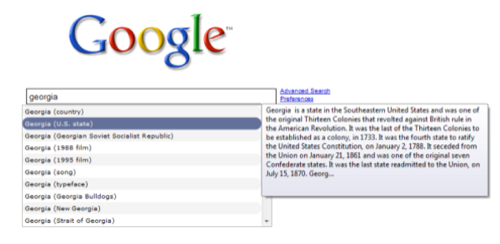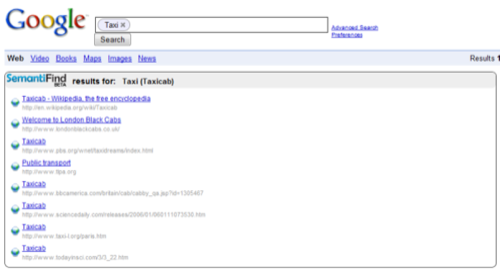SemantiFind is a newly launched semantic search tool which made its debut at the recent DEMO conference. Unlike other semantic search engines such as Hakia and the recently acquiredPowerset, SemantiFind isn’t looking to create a whole new search engine from scratch. Instead, they decided to improve upon the one engine we already use: Google.

How To Use SemantiFind
To get started with SemantiFind, you must first create an account. You can then download the browser plugin which installs the SemantiFind toolbar. This plugin is available for both Internet Explorer and Firefox.
To begin using SemantiFind, you must go to www.google.com – the service won’t work from iGoogle or your Google search box in your browser. After you enter your search term in the box as usual, you then are prompted to indicate the precise meaning of your term before starting your query. This is done through the use of a drop-down box where specific terms and their definitions display. For example, if you were searching for “Georgia,” you would be presented with the option to select either the U.S. state or the former soviet republic.

Once you’ve selected the word which matches your search term, you’ll then be taken to the search results page. The results are simply Google results as you would normally see them, but the extraneous noise from items that don’t match your desired query will not display (in theory).
When you find a page you like, you can then mark it as being relevant and useful with one click of the “Semantify” button on the toolbar. This page will be then be included in your future searches and will also become a part of the SemantiFind community so others may benefit, too. Those “semantified” pages will display at the top of future search results in a separate box.

Does It Work?
Unfortunately, SemantiFind is one of those tools that’s good in theory, but not so good in practice. When performing some test searches, results were not as precise as they should have been. For example, in the above-mentioned search for “Georgia,” a search for the U.S. state returned Google results for the country as well. Also, the SemantiFind search box included a link to a Valleyway story about the Russian invasion of Georgia the country. Obviously, whoever marked that story as relevant to a search for the U.S. state made a mistake, but that just goes to show why search engines that rely on people to filter the results might not work. Human error shouldn’t be a factor in web searches.
Without the “community” element to SemantiFind, the technology could have potential if they would work on providing more accurate results. However, “wisdom of the crowds” is the precise angle they’re going for with this tool as they believe it will lead to the best results. We’re not so sure, but it’s still nice to see some innovation happening in the semantic search space.

















